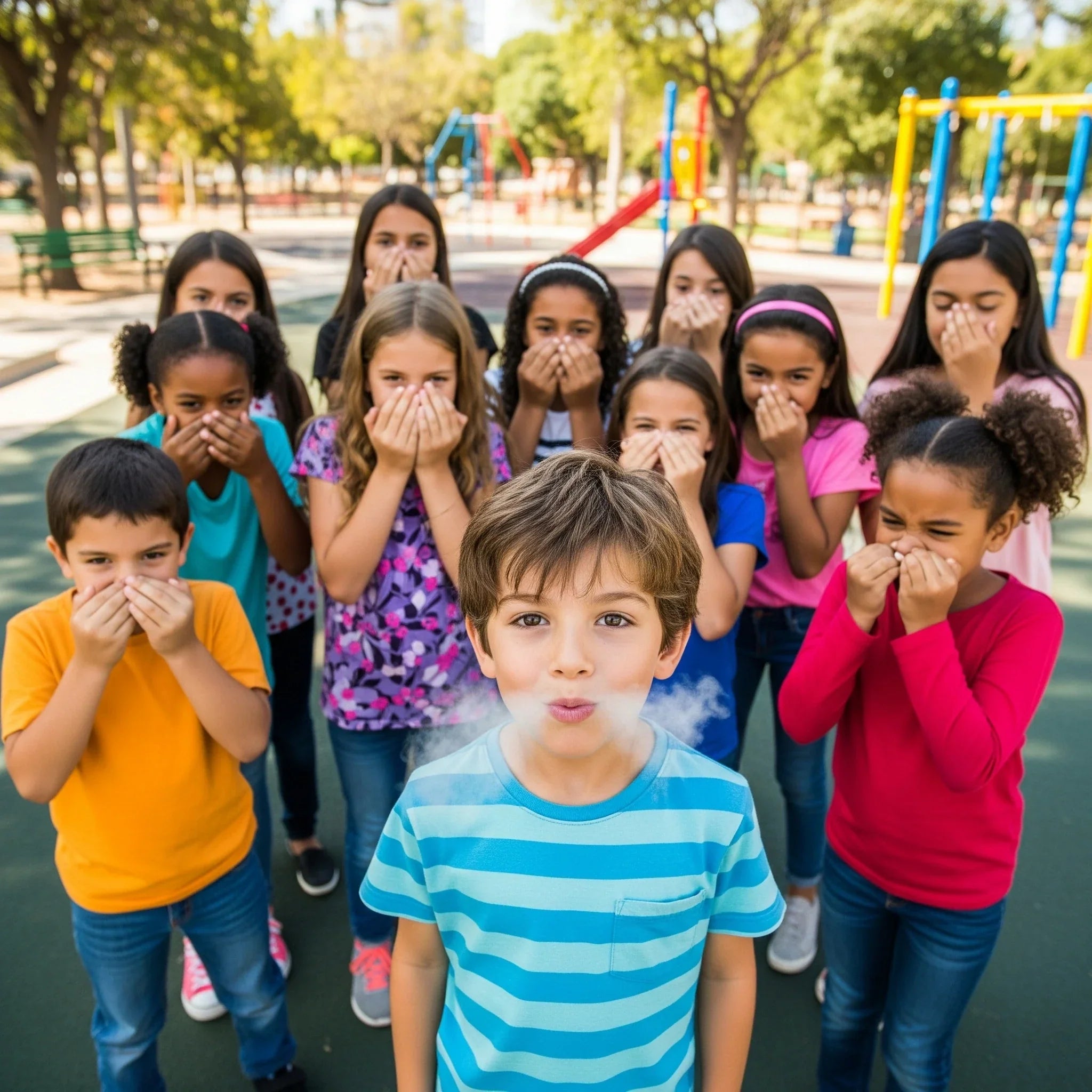Bad breath, also known as halitosis in children, is a more common problem than many parents realise. While it might seem minor, persistent bad breath can indicate underlying health or hygiene problems. Addressing the causes of bad breath in children requires understanding their daily habits, health and diet.
Why Does My Child Have Bad Breath?
Parents often wonder, Why does my child have bad breath? The answer isn’t always straightforward; multiple factors cause bad breath in kids. One of the most common causes of bad breath in children is inadequate brushing and flossing. Bad breath in kids causes include:
- Poor Oral Hygiene: Inadequate brushing and flossing allow food particles to linger, leading to bacterial growth and sulfur compounds. You can teach your kids how to brush correctly using our expert-approved guide.
- Dry Mouth: Lack of hydration or breathing through the mouth reduces saliva production. Saliva plays a vital role in washing away food particles and bacteria.
- Medical Condition: Sinus infections, tonsillitis, or acid reflux can contribute to halitosis in children.
- Consumption of Sugary Foods: Overconsumption of sugary and processed foods. Sugary and sticky snacks promote bacterial growth, leading to halitosis.
Bad breath and diet in kids are interlinked; improper diet choices in kids cause the issue in the first place. Teaching proper oral care and monitoring their diet can address these issues.
Halitosis in Children: What You Need to Know
Understanding halitosis in children involves recognizing the role bacteria play. Bacteria in the mouth break down food particles, producing sulfur compounds that cause unpleasant odours. Key factors include:
- Dental Problems: Cavities and gum infections are common causes. Understand the top causes of cavities in kids here.
- Morning Breath: Reduced saliva production during sleep leads to bacterial buildup.
- Underlying Health Issues: Rarely, conditions like gastrointestinal problems or diabetes might be involved.
Regular dental check-ups can help detect and resolve causes of bad breath in children early, ensuring good oral health.
- Bad Breath and Diet in Kids: Foods That Contribute
Diet plays a significant role in determining your child’s breath. Certain foods can worsen bad breath in kids.
- Odorous Foods: Garlic, onions, and spices often cause lingering smells.
- Sugary Snacks: These encourage bacterial growth and lead to halitosis.
- Low Water Intake: Saliva plays a major role in cleaning away the bacteria from the mouth. A dry mouth due to dehydration increases bad breath.
The connection between bad breath and the diet kids face is clear: encouraging a diet rich in fruits, vegetables, and whole grains promotes better oral health. Drinking water throughout the day also prevents dryness, a major contributor to bad breath.

How to Prevent Bad Breath in Children
Preventing bad breath in kids starts with proper oral hygiene. It involves more than brushing and flossing. Here are some effective strategies:
- Brushing and Flossing: Ensure your child brushes their teeth twice daily with kids toothpaste, a kids toothbrush, and flosses regularly to remove hidden food particles.
- Hydration: Encourage your child to drink plenty of water to maintain saliva production and flush away bacteria.
- Healthy Diet: Reduce sugary snacks and include more fruits and vegetables in their meals to promote oral health.
- Dental Checkups: Regular visits to the dentist can help detect and address any underlying issues contributing to bad breath.
- Tongue Cleaning: Teach your child to clean their tongue, as bacteria often accumulate there.
By addressing these factors, parents can tackle bad breath in kids and promote lifelong oral health habits.
Conclusion
Bad breath in kids is a manageable issue when approached with awareness and consistency. Understanding why your child has bad breath and taking steps to prevent it can ensure their confidence and health. Regular oral hygiene, a balanced diet, and timely medical check-ups are key to preventing halitosis in children.
Frequently Asked Questions
1. How do you treat bad breath in children?
Answer- Treating bad breath involves ensuring good oral hygiene, maintaining proper hydration, and addressing dietary issues. Regular dental checkups can help identify and resolve underlying problems like cavities or gum disease.
2. What helps kids with bad breath?
Answer- Encourage brushing and flossing twice a day, include plenty of water and fibre-rich foods in their diet, and avoid sugary snacks, addressing health issues like allergies is also important for fresh breath.







